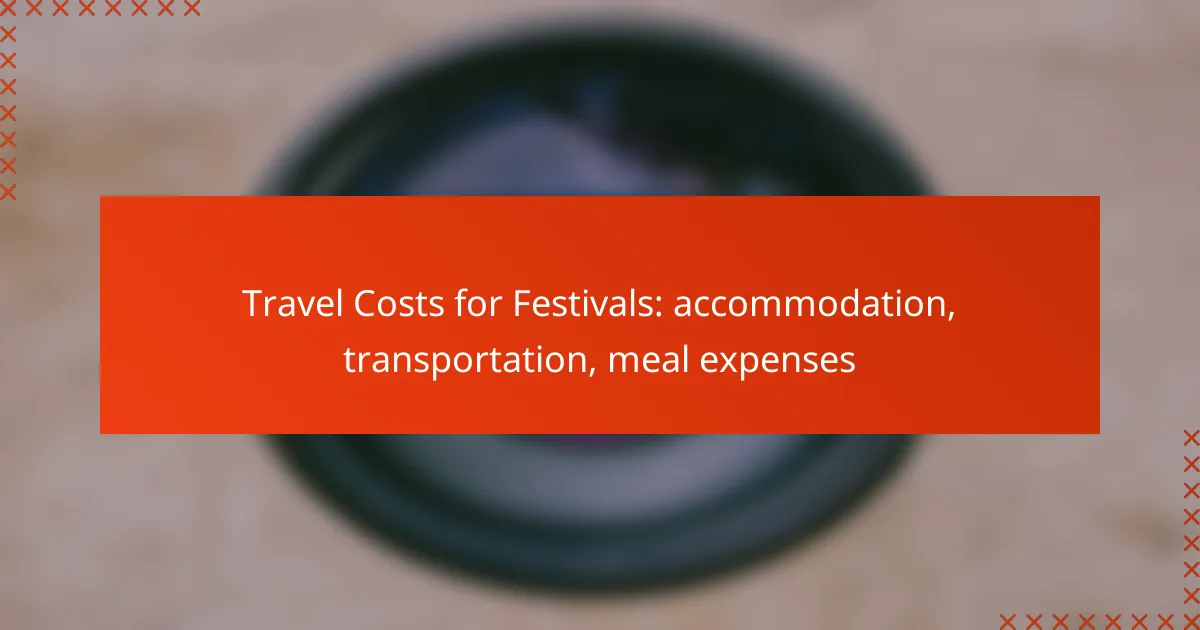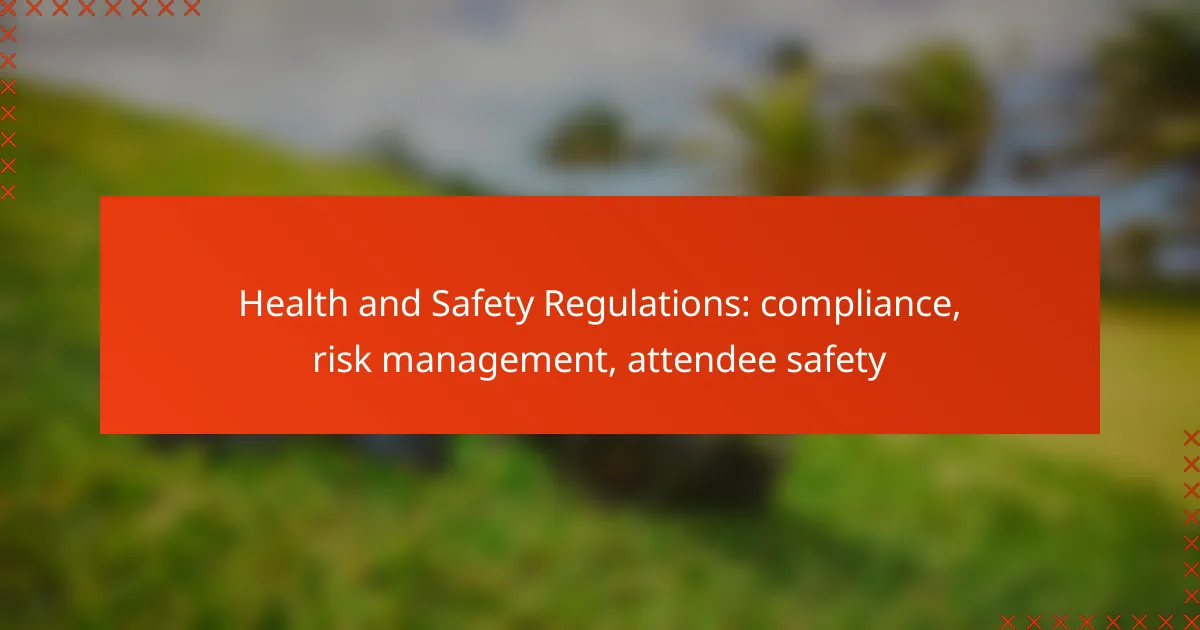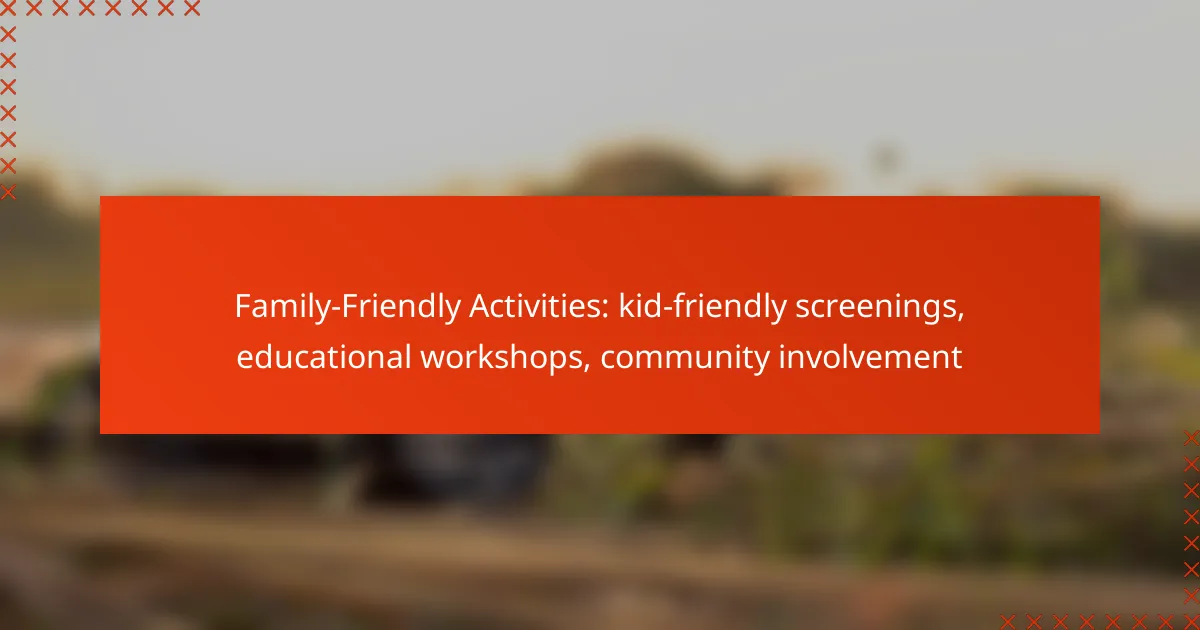Traveling to festivals in Australia requires careful budgeting, as costs can fluctuate based on location, duration, and individual choices. Key expenses to consider include accommodation, transportation, and meals, all of which play a crucial role in your overall festival budget. By understanding these factors, you can plan your trip effectively and ensure a memorable experience without financial strain.
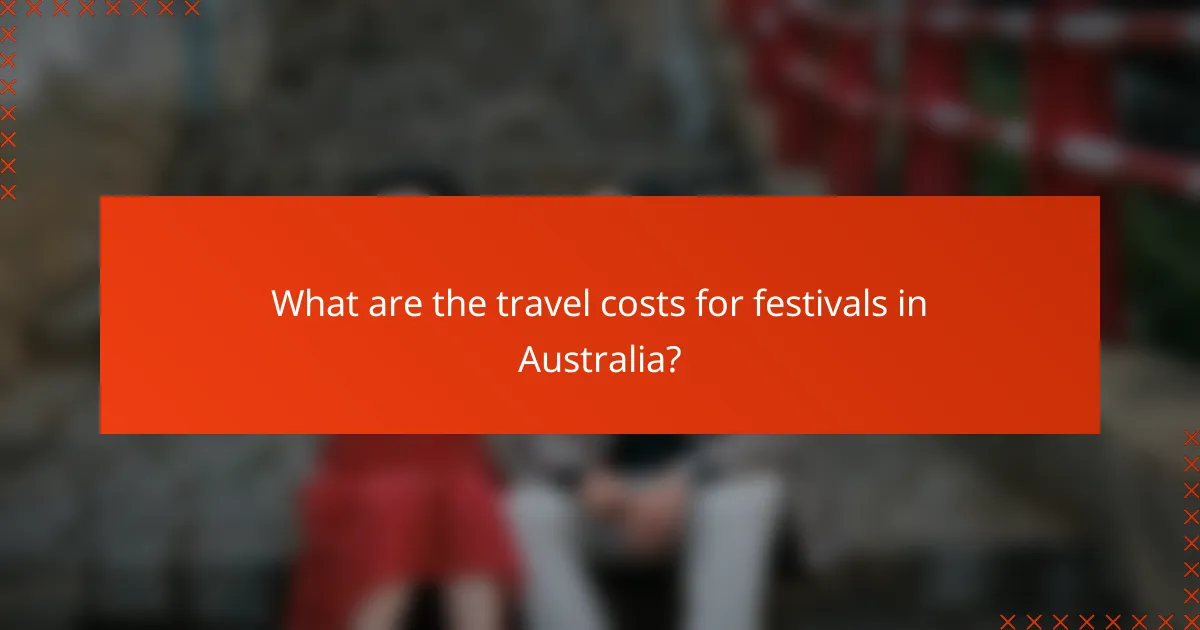
What are the travel costs for festivals in Australia?
Travel costs for festivals in Australia can vary significantly based on location, duration, and personal preferences. Key expenses include accommodation, transportation, and meals, each contributing to the overall budget for attending a festival.
Accommodation expenses
Accommodation costs for festivals in Australia can range from budget-friendly options like camping to more expensive hotels. Camping at the festival site may cost around AUD 50-100 per night, while hotels or Airbnb rentals can range from AUD 150 to over AUD 300 per night, depending on proximity and amenities.
When planning your stay, consider booking early to secure better rates and availability. Some festivals offer package deals that include accommodation, which can be a cost-effective option.
Transportation costs
Transportation expenses will depend on how far you are traveling to the festival. For local attendees, public transport options like buses and trains can cost around AUD 10-30 for a round trip. For those traveling from interstate, flights may range from AUD 100 to AUD 300, plus additional costs for airport transfers.
Consider carpooling with friends or using rideshare services to reduce costs. If driving, factor in fuel expenses and parking fees, which can add up quickly.
Meal expenses
Meal costs at festivals can vary widely, with food stalls typically charging AUD 10-20 per meal. If you plan to eat at the festival, budgeting around AUD 50-100 per day for food is advisable, depending on your eating habits.
To save money, consider bringing snacks or a refillable water bottle. Some festivals allow attendees to bring their own food, which can significantly cut down on meal expenses.

How to budget for festival travel in Australia?
Budgeting for festival travel in Australia involves estimating costs for accommodation, transportation, and meals. Understanding these expenses will help you plan effectively and enjoy your festival experience without financial stress.
Estimate accommodation costs
Accommodation costs can vary widely based on location, type, and time of booking. In major cities or popular festival areas, prices can range from AUD 100 to AUD 300 per night for hotels, while budget options like hostels may start around AUD 30 per night.
Consider alternative lodging such as Airbnb or camping, which can offer more affordable or unique experiences. Booking in advance often secures better rates, especially during peak festival seasons.
Calculate transportation expenses
Transportation costs will depend on your travel method and distance to the festival. If flying, factor in airfare, which can range from AUD 100 to AUD 500 depending on your origin. For local travel, public transport is usually economical, with fares typically between AUD 3 and AUD 10 per trip.
Renting a car can be convenient for reaching remote festivals, but don’t forget to include fuel and parking costs, which can add up quickly. Always compare options to find the most cost-effective solution for your needs.
Plan meal budgets
Meal expenses can vary based on dining preferences. Eating at restaurants may cost around AUD 15 to AUD 40 per meal, while grabbing quick bites or street food can be more affordable, often under AUD 15. Consider budgeting around AUD 50 to AUD 100 per day for meals.
To save money, plan to prepare some meals if you have access to kitchen facilities, or pack snacks for the festival. This approach can help you manage your budget while still enjoying the local cuisine.

What are the best accommodation options for festivals?
The best accommodation options for festivals vary based on proximity, budget, and personal preferences. Common choices include hotels, camping sites, and hostels, each offering unique advantages and considerations for festival-goers.
Hotels near festival venues
Hotels near festival venues provide convenience and comfort, often allowing easy access to the event. Prices can range from moderate to high, typically starting around $100 per night, depending on the location and amenities.
When booking, consider factors like cancellation policies and proximity to public transport. Early reservations are advisable, as hotels can fill quickly during popular festivals.
Camping options
Camping options are often the most budget-friendly choice, with many festivals offering designated camping areas. Costs can vary, typically ranging from $20 to $50 per night for a basic spot.
Camping allows for a communal experience but requires preparation. Bring necessary gear, such as tents and sleeping bags, and check the festival’s rules regarding campfires and food storage.
Hostel alternatives
Hostels provide a social atmosphere at a lower cost, usually between $30 and $70 per night for a shared room. They are ideal for solo travelers or those looking to meet new people.
When choosing a hostel, look for reviews regarding cleanliness and safety. Some hostels may offer shuttle services to festival sites, adding convenience to your stay.
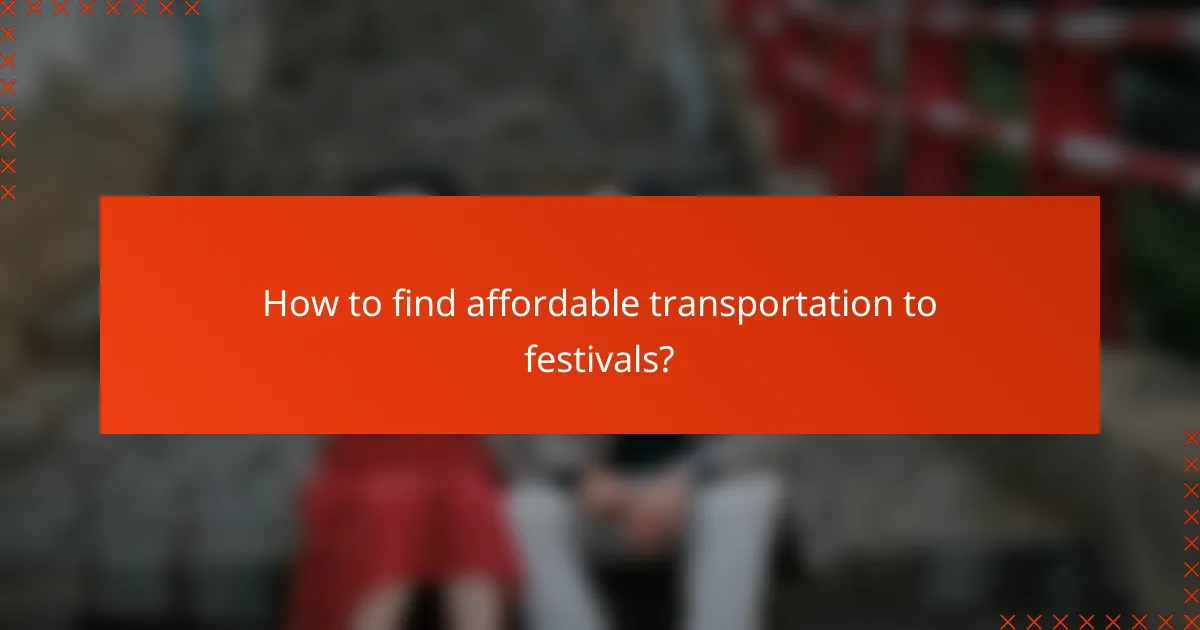
How to find affordable transportation to festivals?
Finding affordable transportation to festivals involves exploring various options that can save you money while ensuring convenience. Consider public transport, carpooling, and ride-sharing apps to find the best fit for your budget and schedule.
Public transport options
Public transport is often the most economical way to reach festivals, especially in urban areas. Buses and trains can provide direct routes to festival locations, typically costing between $2 to $15 depending on distance and region.
Check local transit schedules and routes in advance to avoid delays. Many cities offer special festival passes that can reduce costs further, so look for those options when planning your trip.
Carpooling services
Carpooling services allow festival-goers to share rides, splitting costs and reducing the environmental impact. Platforms like BlaBlaCar or local Facebook groups can help you connect with others heading to the same event.
When using carpooling, ensure you agree on costs upfront and confirm pickup locations. This can typically save you 30-50% compared to solo driving, especially when considering fuel and parking fees.
Ride-sharing apps
Ride-sharing apps like Uber and Lyft provide flexible transportation options for festival attendees. Prices can vary based on demand, but using these services can be convenient, especially if public transport isn’t available.
To save money, consider sharing a ride with friends or using the app during off-peak hours. Always check for promo codes or discounts that may apply to your ride, as these can significantly reduce your fare.

What are the average meal costs at festivals?
Average meal costs at festivals can vary significantly based on location, type of event, and dining options available. Generally, festival-goers can expect to spend anywhere from $10 to $30 per meal, depending on whether they choose food trucks, on-site dining, or nearby restaurants.
Food truck prices
Food trucks at festivals typically offer a range of quick bites and meals, with prices often ranging from $8 to $15. Popular items like tacos, burgers, and gourmet sandwiches can be found at these vendors. While food trucks provide convenience, be prepared for longer lines during peak hours.
On-site dining options
On-site dining options at festivals may include sit-down restaurants or casual eateries, with meal prices generally between $15 and $30. These venues often provide a more extensive menu and a comfortable dining experience. However, they can be busier and may require reservations during popular events.
Nearby restaurant costs
Nearby restaurants can offer a variety of meal choices, with prices typically ranging from $10 to $50 depending on the establishment’s type and cuisine. Fast-casual spots may be more budget-friendly, while fine dining options could be pricier. Consider checking online reviews and menus ahead of time to find the best value for your meal.

What are the hidden costs of festival travel?
Hidden costs of festival travel can significantly impact your overall budget. Beyond tickets, expenses like parking fees and service charges can add up quickly, so it’s essential to plan for these additional costs.
Parking fees
Parking fees at festivals can vary widely, often ranging from a few dollars to over fifty dollars per day, depending on the event’s location and popularity. Some festivals offer free parking, but these spots may fill up quickly, forcing attendees to pay for premium parking options.
When planning for parking, consider the distance from the parking area to the festival entrance. Walking long distances can be inconvenient, especially if you’re carrying gear or supplies. Researching parking options in advance can help you avoid unexpected fees.
Service charges
Service charges are often added to ticket prices and can include processing fees, convenience fees, or delivery charges. These fees can range from a few dollars to a significant percentage of the ticket price, so always check the final cost before purchasing.
To minimize service charges, consider buying tickets directly from the festival’s official website or authorized vendors. Avoid third-party sites that may impose higher fees. Additionally, be aware of any hidden charges when booking accommodations or transportation associated with the festival.
